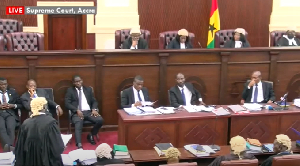Opinions of Monday, 25 March 2024
Columnist: Aaron Babako Korkormissah
Presidency versus parliament and powers of the Speaker of Parliament to place an injunction
In political systems around the world, the balance of power between the presidency and parliament is a crucial aspect that has a significant impact on the functioning of the government. The division of powers between these two branches of government often determines the level of accountability, efficiency, and representativeness of the political system. While there are variations in the powers and roles of the presidency and parliament in different countries, the general debate over the relative strengths and weaknesses of each institution remains a central focus of political analysis.
The presidency is a form of government in which the chief executive officer (president) has significant powers and authority, often including the ability to make decisions without the approval of the legislature. The president is usually elected through a separate process from the legislature and is often seen as the head of state and government. In contrast, a parliamentary system of government is one in which the executive branch is drawn from the legislature, with the head of government (prime minister) being elected by and accountable to the parliament. The president, if one exists, is usually a figurehead with limited powers.
One of the main advantages of a presidential system is the clear separation of powers between the executive and legislative branches of government. This can create a system of checks and balances that prevents any one branch from gaining too much power. In a parliamentary system, on the other hand, the executive and legislative branches are often fused, which can result in a lack of separation of powers and the potential for the executive to dominate the legislature. This can lead to a lack of accountability and oversight, as the executive branch is not held in check by the legislature.
Another advantage of a presidential system is the stability it can provide. The president is often elected to a fixed term of office, which can help to provide continuity and predictability in government. In a parliamentary system, on the other hand, the government can be easily dissolved through a vote of no confidence, which can lead to frequent changes in leadership and instability. This can make it difficult for the government to enact long-term policies and can undermine the government's credibility.
However, a presidential system can also have its drawbacks. One of the main criticisms of a presidential system is that it can lead to gridlock and political polarization. Because the president is not directly accountable to the legislature, there can be conflicts between the executive and legislative branches that make it difficult to pass legislation and govern effectively. In a parliamentary system, on the other hand, the prime minister is accountable to the parliament and can be easily removed if they lose the support of the legislature. This can promote cooperation and compromise in government.
Furthermore, a presidential system can sometimes lack the representativeness of a parliamentary system. Because the president is elected separately from the legislature, they may not have the same level of legitimacy and accountability as a prime minister who is drawn from the parliament. This can lead to a lack of responsiveness to the will of the people and a disconnect between the executive and legislative branches. In a parliamentary system, on the other hand, the prime minister is directly accountable to the parliament, which can help ensure that the government is more responsive to the needs and desires of the people.
In a parliamentary system, the Speaker of Parliament plays a crucial role in maintaining order and ensuring the smooth functioning of the legislative body. One of the powers held by the Speaker is the ability to place an injunction, or temporary suspension, on parliamentary proceedings.
Grounds for placing an injunction:
Several grounds may lead to the Speaker of Parliament placing an injunction on parliamentary proceedings. One of the most common reasons is the disruption of order and decorum within the chamber. If members of parliament are engaging in disruptive behaviour, such as shouting, heckling, or physical altercations, the Speaker may choose to place an injunction to restore order and maintain the dignity of the legislative body.
Another ground for placing an injunction is the violation of parliamentary rules and procedures. If members of parliament are not following the established rules for debate, voting, or other parliamentary processes, the Speaker may intervene to ensure that proper procedures are being followed. This is essential for upholding the integrity of the legislative process and ensuring that decisions are made fairly and transparently.
Additionally, the Speaker may place an injunction if there are concerns about the safety or security of members of parliament or parliamentary staff. If there is a threat of violence or disruption from outside parties, the Speaker may choose to suspend proceedings to protect the safety of everyone present in the chamber.
Reasons for placing an injunction:
There are several reasons why the Speaker of Parliament may choose to place an injunction in response to the grounds mentioned above. One of the primary reasons is to maintain the credibility and effectiveness of the legislative body. By enforcing order and upholding parliamentary rules, the Speaker ensures that parliamentary proceedings are conducted professionally and respectfully. This in turn enhances the reputation of the institution and helps to demonstrate the importance of the parliamentary process to the public.
Placing an injunction can also serve to prevent further escalation of conflicts or disruptions within the chamber. By intervening early and decisively, the speaker can help to defuse tensions and prevent situations from spiralling out of control. This proactive approach can help to ensure that parliamentary proceedings remain focused on the issues at hand rather than being dominated by personal conflicts or disruptive behaviour.
Another reason for placing an injunction is to protect the rights and privileges of all members of parliament. By enforcing parliamentary rules and ensuring that proceedings are conducted fairly and transparently, the Speaker helps to safeguard the rights of elected representatives to participate in the legislative process. This ensures that the voices of all members are heard and respected and that decisions are made democratically and inclusively.
Conclusion:
In conclusion, several grounds may lead to the Speaker of Parliament placing an injunction on parliamentary proceedings, including the disruption of order and decorum, violations of parliamentary rules, and concerns about safety and security. The Speaker may choose to place an injunction to maintain the credibility and effectiveness of the legislative body, prevent further escalation of conflicts, and protect the rights and privileges of all members of parliament. By exercising this power judiciously and in the best interests of the institution, the Speaker plays a vital role in ensuring the smooth functioning of the parliamentary system.













